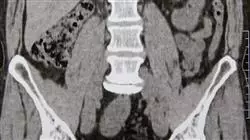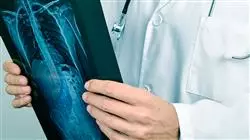University certificate
The world's largest faculty of medicine”
Introduction to the Program
The new scenarios in current Radiology push us to propose new training programs that meet the real needs of experienced professionals, so that they can incorporate the advances in the field of Diagnostic Imaging techniques of the Abdomen into their daily practice"

Imaging of abdominal pathology is a radiological sub specialty that has experienced great advances in recent years. Rapid and accurate diagnosis is essential in abdominal pathology. Likewise, the increase in neoplasms affecting solid viscera and the colon and rectum has conditioned the development of this radiological sub specialty.
Due to the high prevalence of abdominal neoplasms and the important role of radiological techniques, the methods of staging and assessment of the response to treatment of rectal and prostate cancer are presented. The knowledge of the technique is essential for a correct study of the patient, reviewing the latest advances in Colono-CT and defecography.
This Postgraduate certificate is oriented to facilitate the updating of the medical specialist in the radiodiagnosis of the most important abdominal processes, with special attention to liver and biliary tract diseases, pancreatic pathology, splenic lesions, inflammatory bowel disease and urological pathology.
Additionally, it is completed with a module on current topics, with the use of imaging biomarkers, dual-energy CT and multiparametric studies in Radiology.
You will be able to learn, through the latest educational technology, the latest advances in Diagnostic Imaging of the Abdomen"
This Postgraduate certificate in Diagnostic Imaging of the Abdomen contains the most complete and up-to-date scientific program on the market. The most important features include:
- Clinical cases presented by specialists in Radiodiagnostics and other specialties
- The graphic, schematic, and practical contents with which they are created, provide scientific and practical information on the disciplines that are essential for professional practice
- Real high-resolution images of pathologies, diagnostic imaging tests and guided procedures
- Presentation of practical workshops on procedures and techniques
- An algorithm-based interactive learning system for decision-making in the clinical situations presented throughout the course
- Action protocols with the most important advances in the techniques in Diagnostic Imaging
- All of this will be complemented by theoretical lessons, questions to the expert, debate forums on controversial topics, and individual reflection assignments
- Content that is accessible from any fixed or portable device with an Internet connection
This Postgraduate certificate is the best investment you can make in the selection of a refresher program for two reasons: in addition to updating your knowledge in Diagnostic Imaging of the Abdomen, you will obtain a qualification from TECH Global University"
The teaching staff includes a team of leading Radiologists who bring their professional experience to this program, in addition to renowned specialists in other medical areas.
The multimedia content developed with the latest educational technology will provide the physician with situated and contextual learning, i.e., a simulated environment that will provide immersive training programmed to train in real situations.
This program is designed around Problem-Based Learning, whereby the specialist must try to solve the different professional practice situations that arise throughout the Postgraduate certificate. For this purpose, they will be aided by an innovative interactive video system created by renowned experts in the field of Radiology with extensive teaching experience.
Incorporate the latest developments in Diagnostic Imaging of the Abdomen to your medical practice and improve the prognosis of your patients.

The program includes real clinical cases and exercises to bring the development of the Postgraduate certificate closer to medical practice.
Why study at TECH?
TECH is the world’s largest online university. With an impressive catalog of more than 14,000 university programs available in 11 languages, it is positioned as a leader in employability, with a 99% job placement rate. In addition, it relies on an enormous faculty of more than 6,000 professors of the highest international renown.

Study at the world's largest online university and guarantee your professional success. The future starts at TECH”
The world’s best online university according to FORBES
The prestigious Forbes magazine, specialized in business and finance, has highlighted TECH as “the world's best online university” This is what they have recently stated in an article in their digital edition in which they echo the success story of this institution, “thanks to the academic offer it provides, the selection of its teaching staff, and an innovative learning method aimed at educating the professionals of the future”
A revolutionary study method, a cutting-edge faculty and a practical focus: the key to TECH's success.
The most complete study plans on the university scene
TECH offers the most complete study plans on the university scene, with syllabuses that cover fundamental concepts and, at the same time, the main scientific advances in their specific scientific areas. In addition, these programs are continuously being updated to guarantee students the academic vanguard and the most in-demand professional skills. In this way, the university's qualifications provide its graduates with a significant advantage to propel their careers to success.
TECH offers the most comprehensive and intensive study plans on the current university scene.
A world-class teaching staff
TECH's teaching staff is made up of more than 6,000 professors with the highest international recognition. Professors, researchers and top executives of multinational companies, including Isaiah Covington, performance coach of the Boston Celtics; Magda Romanska, principal investigator at Harvard MetaLAB; Ignacio Wistumba, chairman of the department of translational molecular pathology at MD Anderson Cancer Center; and D.W. Pine, creative director of TIME magazine, among others.
Internationally renowned experts, specialized in different branches of Health, Technology, Communication and Business, form part of the TECH faculty.
A unique learning method
TECH is the first university to use Relearning in all its programs. It is the best online learning methodology, accredited with international teaching quality certifications, provided by prestigious educational agencies. In addition, this disruptive educational model is complemented with the “Case Method”, thereby setting up a unique online teaching strategy. Innovative teaching resources are also implemented, including detailed videos, infographics and interactive summaries.
TECH combines Relearning and the Case Method in all its university programs to guarantee excellent theoretical and practical learning, studying whenever and wherever you want.
The world's largest online university
TECH is the world’s largest online university. We are the largest educational institution, with the best and widest online educational catalog, one hundred percent online and covering the vast majority of areas of knowledge. We offer a large selection of our own degrees and accredited online undergraduate and postgraduate degrees. In total, more than 14,000 university degrees, in eleven different languages, make us the largest educational largest in the world.
TECH has the world's most extensive catalog of academic and official programs, available in more than 11 languages.
Google Premier Partner
The American technology giant has awarded TECH the Google Google Premier Partner badge. This award, which is only available to 3% of the world's companies, highlights the efficient, flexible and tailored experience that this university provides to students. The recognition as a Google Premier Partner not only accredits the maximum rigor, performance and investment in TECH's digital infrastructures, but also places this university as one of the world's leading technology companies.
Google has positioned TECH in the top 3% of the world's most important technology companies by awarding it its Google Premier Partner badge.
The official online university of the NBA
TECH is the official online university of the NBA. Thanks to our agreement with the biggest league in basketball, we offer our students exclusive university programs, as well as a wide variety of educational resources focused on the business of the league and other areas of the sports industry. Each program is made up of a uniquely designed syllabus and features exceptional guest hosts: professionals with a distinguished sports background who will offer their expertise on the most relevant topics.
TECH has been selected by the NBA, the world's top basketball league, as its official online university.
The top-rated university by its students
Students have positioned TECH as the world's top-rated university on the main review websites, with a highest rating of 4.9 out of 5, obtained from more than 1,000 reviews. These results consolidate TECH as the benchmark university institution at an international level, reflecting the excellence and positive impact of its educational model.” reflecting the excellence and positive impact of its educational model.”
TECH is the world’s top-rated university by its students.
Leaders in employability
TECH has managed to become the leading university in employability. 99% of its students obtain jobs in the academic field they have studied, within one year of completing any of the university's programs. A similar number achieve immediate career enhancement. All this thanks to a study methodology that bases its effectiveness on the acquisition of practical skills, which are absolutely necessary for professional development.
99% of TECH graduates find a job within a year of completing their studies.
Postgraduate Certificate in Abdomen Diagnostic Imaging
The technological development around diagnostic imaging methods has allowed the evolution of the area of detection of pathologies and anomalies of the abdomen, standing out as a field of constant progress and innovation. Due to this situation, academic updating has become relevant as an indispensable requirement for professionals specialized in the field in order to perform optimally in the sector. In response to this need and with the intention of offering training alternatives of the highest quality, in TECH Global University we have designed a Postgraduate Certificate in Diagnostic Imaging of the Abdomen. In this postgraduate course, the role of iodinated contrasts in the detection of focal hepatic lesions will be studied in depth. In addition, it will delve into the modernization of the following topics: the identification of the different techniques applied to the development of a process of computed tomography colonography; followed by the knowledge of the new methodologies applied to the study and detection of pathologies of the biliary tract.
Study an online Postgraduate Certificate in diagnostic imaging of the abdomen.
The proper development of a diagnostic imaging process of the abdominal area requires the management of specialized professionals with a high degree of skill, ability and knowledge, based on the optimal resolution of any apparent vicissitude in the procedure. In our program you will approach the current methodological trends in the area, identifying the protocol and technological guidelines of the modern development of the sector. Likewise, this postgraduate program will deepen the professional's update regarding the following concepts: knowledge of the indications to be considered in the development of a defecography procedure; followed by the identification of the possibilities present in the use of diagnostic imaging techniques in the management and monitoring of cases of liver cirrhosis.







